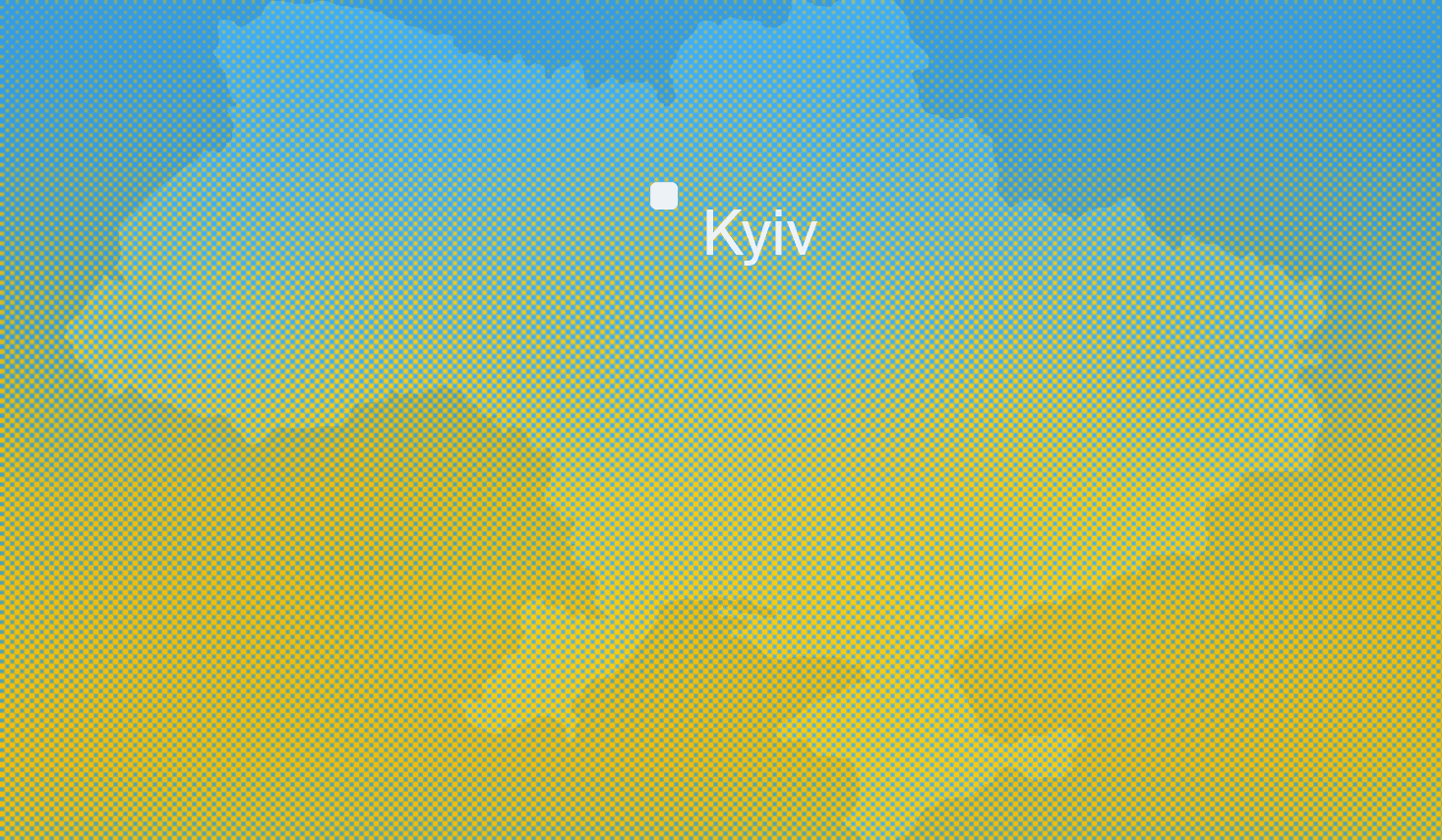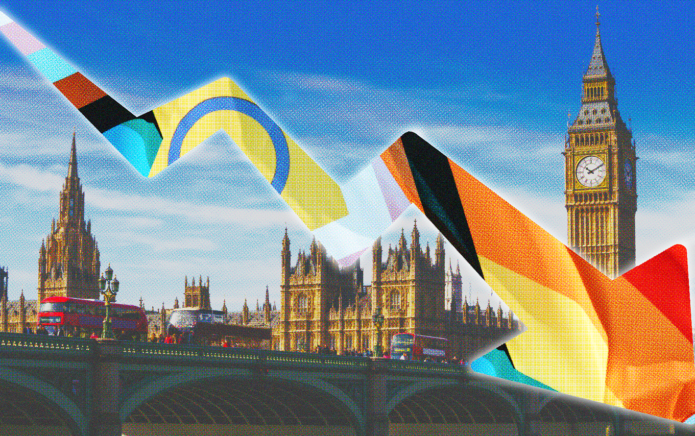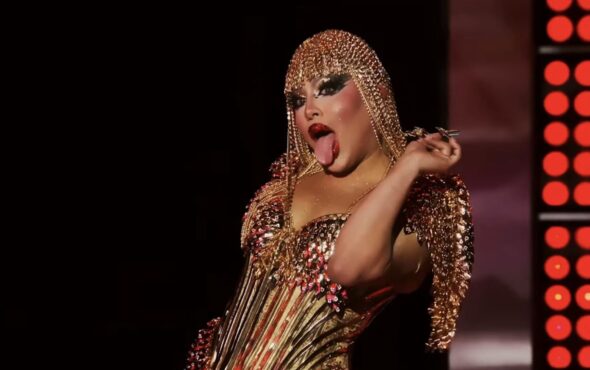
“I never thought that I would be an internally displaced person,” said Olena, a Ukrainian forced to flee her home because of Russia’s invasion. “I never thought before that I would have this refugee experience.” Since leaving Kyiv, she has worked to establish shelters for LGBTQ+ people in need and a crisis line for community members needing support.
LGBTQ+ people are often disproportionately affected during times of humanitarian crisis and the war in Ukraine is no different. On 5 April 2022, GiveOut, a charity working to support the global struggle for the community’s rights, hosted a briefing on the situation for LGBTQ+ people as the situation progresses on the ground. GAY TIMES attended the event, which was chaired by Daniel Gerring, a trustee of GiveOut and Refugees at Home, and took place to give expert insight into the emergency response to the war and the situation for those trying to leave Ukraine. Olena joined virtually to share her experience, which was part of a wider discussion by a panel made up of Nancy Kelley from Stonewall, Sonia Lenegan from Rainbow Migration and Paul Jansen from OutRight.
What is happening in Ukraine?
For months, Western officials reported that Russia was planning an invasion of Ukraine that could begin at any moment – something Vladimir Putin adamantly denied. In the early hours of 24 February, however, Ukrainian officials stated that Russia had launched an all-out assault on the country, with troops crossing the border.
Since then, the world has seen the fastest and largest displacement of people in Europe since the Second World War – with an estimated 10 million people having fled their homes in the country, according to the United Nations. More than 4.3 million of these have gone to one of the seven countries Ukraine shares a border with: Poland, Slovakia, Hungary, Romania, Moldova, Russia and Belarus.
4 million people have fled Ukraine to seek safety in other countries.
As the UN works tirelessly to help those affected by the war, see how we can all take action to stand #WithRefugees. https://t.co/wZR5NdiGNt via @Refugees pic.twitter.com/MrRSvuCfDK
— United Nations (@UN) April 3, 2022
“It is concerning, particularly this insistence that you have to stay in what the Home Office deems a ‘safe’ country,” Lenegan, the Legal and Policy Director at Rainbow Migration, explained at GiveOut’s briefing. “We know that some of the countries that are neighbouring Ukraine are not good for LGBTQ+ people in the slightest. You know, Poland, Hungary – it is not fair to expect people to stay there and it is completely understandable that instead they may seek to come to the UK and they may want to stay here.”
Reliable figures on how many people have died as a result of Russia’s attack on Ukraine are hard to come by. The United Nations Human Rights Office of the High Commissioner estimated that 1,035 civilians were killed and 1,650 injured in the first month of the war alone – a figure which has likely risen substantially following recent allegations of Russia targeting them specifically.
What is the situation for LGBTQ+ people in Ukraine?
There are an array of unique issues facing Ukraine’s LGBTQ+ community in the wake of Russia’s invasion that are impossible to succinctly sum up. Many face the decision of fleeing to a country where queer people are persecuted or remaining in Ukraine as the war continues. Although there is still a lot of work to be done on LGBTQ+ rights in Ukraine, Russia’s long history of persecution against the community, such as its gay propaganda law and anti-gay purges in Chechnya, has left queer people in Ukraine terrified of what the invasion could mean for their future.
Edward Reese, project assistant at KyivPride, spoke to GAY TIMES just two days after the war began: “We hope, we believe and actually we know that we will win this war. Surely with some losses, but we will win. If we fantasise, if Russia comes over Ukraine, for sure, it will be [the] darkest times because right now in Russia it is darkest times for queer people.”
To all our supporters in the world: Call on your governments to stand up and to take action against the war in Ukraine! We need to stop it now, we need to show how powerful we are all together, and Putin will stand no chance!
— KyivPride (@KyivPride) February 24, 2022
Despite inclusive policies like same-sex marriage being constitutionally banned in Ukraine and the country’s ongoing issues with the far-right, Edward stated that the Ukrainian government “is supporting gay rights” in a way that makes most LGBTQ+ people feel protected – something that may not be the case if Russia successfully occupies the country.
Kelley, the CEO of Stonewall, raised the problems transgender people are facing when trying to leave Ukraine: “We’ve engaged directly and heard a lot from partners specifically around the position specifically of trans women, who don’t have the correct gender markers on their identity documents and are finding it very difficult to exit Ukraine and are at risk of conscription.”
Drug supplies are becoming an increasingly clear issue arising for the population of Ukraine, which in turn is impacting LGBTQ+ people who rely on them. Estimates state that around 260,000 people are living with HIV in Ukraine (half of which were taking antiretroviral treatment before the invasion), making it the second largest number in Europe after Russia. The appropriate drugs are needed to control the virus and prevent it spreading to other people, with disruption to it potentially resulting in harmful complications.
A total of 209,000 packs of generic antiretroviral drug TLD have been secured by the World Health Organisation alongside Ukrainian authorities, the United States President’s Emergency Plan for AIDS Relief (PEPFAR) and other partners to supply HIV positive people with the help they need for at least the next 12 months, it was confirmed on 5 April. However, these drugs, as well as others in demand from people in the community, reaching those in need continues to be an obstacle that is proving difficult to overcome.
.@WHO,@PEPFAR, Ukrainian authorities and partners are ensuring the supply of antiretroviral drugs, covering most of the needs of every single person known to be living with HIV in #Ukraine for the next 12 months. pic.twitter.com/sUcKSK2vci
— WHO Ukraine (@WHOUkraine) April 6, 2022
“What we do see now is that groups are asking for longer term support because we know that this is not a conflict or a war of aggression that will stop soon,” said Jansen of OutRight as he emphasised the importance of people donating resources to help Ukrainians in danger, particularly groups who are adapting to the ever-changing situation.
He continued: “I am thankful and grateful for our friends in Ukraine who never were humanitarian organisations, I think that’s an important thing to note. These were LGBTQ+ organisations working on advocacy, on rights etc. and they’re now forced into a completely different ball game, which is humanitarian assistance, emergency assistance and they’re doing a brilliant job, as best as they can.”
What is the UK doing to help?
The UK, alongside a range of other nations, has imposed a number of sanctions on Russia in a bid to penalise those who have benefitted from Putin’s regime and ultimately bring an end to the war. These include, but are by no means limited to, a commitment to ending all imports of Russian coal and oil by the end of the year, prohibiting Russian flights from entering the UK’s airspace, and sanctioning a number of individuals and businesses who are believed to be close to the Kremlin. Although some sanctions may seem insignificant, they are among the harshest actions a country can take against another – short of going to war or engaging with military action.
As well as this, the government has supplied Ukraine with aid to help in its fight against Russia’s military and disinformation campaign. This includes support such as £25 million in financial backing for the Ukrainian military, an additional £4.1 million for the BBC World Service to help combat fake news, and giving the country some of the additional weaponry it needs.
Today the UK steps up its stringent package of sanctions on Putin’s regime.
We will not let Russia's appalling crimes go unnoticed or unpunished.
Ukraine must prevail. https://t.co/mOHDpDtGeB
— Boris Johnson (@BorisJohnson) April 6, 2022
However, Lenegan explained that the UK is falling short when it comes to welcoming refugees into the country: “What the UK has done so far is they’ve set up three different schemes for Ukraininans, which I think is indicative of how much they’ve really not planned ahead for this and they’re really chasing their tale with the fact that we have three separate schemes.
“The first one was the Ukraine Family Scheme, then Homes for Ukraine, and I think it was last week or the week before, they’ve announced the Ukrainian Extension Scheme, which is for people who are already in the UK. The delays that we are hearing about already are hugely concerning in relation to the schemes for people who are outside the UK and wanting to come in.
“It’s also concerning that the schemes that have been announced are for Ukrainian nationals only. So, we know that excludes LGBTQ+ people in particular who have gone to Ukraine because it’s safer, for example, than Russia. They are not covered by these schemes, so they don’t have a route to the UK unless it’s via the Channel, basically.”
Around 12,000 people have safely arrived in the UK under these visa schemes as of 5 April, despite around 79,800 applications having been received for Homes for Ukraine and the Ukraine Family Scheme, the Home Office confirmed.
We are working with partner #LGBTQI+ organisations here in the UK, signposting LGBTQI+ Ukrainians to trusted LGBTQI+ support services🌈.
Here is a list of ways in which you can help LGBTQI+ Ukrainians: https://t.co/7DyDYlAjBP pic.twitter.com/Hl3cDg6Ju4
— Rainbow Migration (@rainbowmigrants) March 25, 2022
What can you do to help?
On an individual level, the simple answer is to donate money. GiveOut has activated its LGBTQ+ Emergency Fund which will see donations go directly to OutRight’s appeal in a bid to give queer Ukrainians the support they need. Donations from the UK are particularly helpful as GiveOut is able to claim Gift Aid on all eligible contributions, meaning an extra 25p for every £1 given.
All panellists at GiveOut’s briefing agreed that lobbying MPs is one of the easiest ways to help LGBTQ+ people in crisis both in Ukraine and other regions. “Never underestimate the power of one or two incredibly stubborn parliamentarians who get absolutely fixated on an issue,” Kelley told the audience. “So, if anybody could make one parliamentarian in either House obsessed with LGBTQ+ refugees, that would make an enormous difference.” You can find more information on how to contact your local MP by clicking here.
Kelley called on businesses to start “forming long-term partnerships with LGBTQ+ organisations in Ukraine and surrounding countries” as this infrastructure is “incredibly powerful” for the LGBTQ+ community. In addition, she expressed the need for “a protection system internationally and a humanitarian protection system that addresses the fact our communities exist.”
GiveOut has activated our #LGBTQI Emergency Fund to support @OutRightIntl’s appeal which was launched in response to the unfolding situation in Ukraine. By donating through GiveOut, we can claim Gift Aid on all eligible donations. #StandWithUkraine https://t.co/uIB2aa9JDq
— GiveOut (@GiveOut_Org) February 25, 2022
To learn more about GiveOut’s emergency fund and to donate, click here.
More information on OutRight’s fundraising can be found here.



